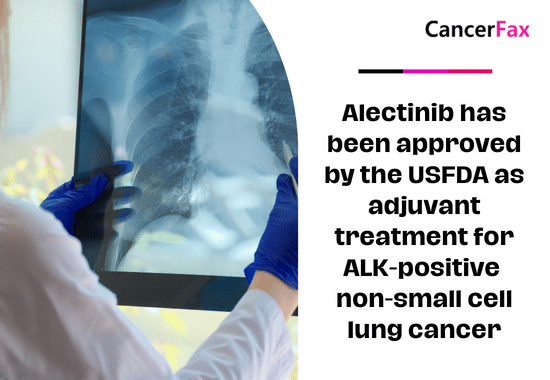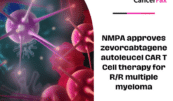Alectinib has been approved by the USFDA as adjuvant treatment for ALK-positive non-small cell lung cancer
Alectinib approved in the treatment of non-small cell lung cancer
The Food and Drug Administration (FDA) has approved the drug Alecensa, made by Genentech, Inc. It can be used as an extra treatment for people who have had tumor removal and have anaplastic lymphoma kinase (ALK)-positive non-small cell lung cancer (NSCLC). This approval is contingent upon the detection of ALK-positive NSCLC using an FDA-approved test.
Effectiveness and Security
In a worldwide, randomized, open-label clinical trial (ALINA, NCT03456076), people with ALK-positive NSCLC who had had the tumor completely removed showed that the treatment worked. To be eligible, patients had to have non-small cell lung Cancer in Stages IB (tumors 4 cm or larger) to IIIA that could be removed surgically, according to the 7th edition of the American Joint Committee on Cancer staging system.
Also, changes in the ALK gene had to be found by either an FDA-approved ALK test done locally or a VENTANA ALK (D5F3) CDx assay done centrally. There were 257 individuals who were randomly assigned in a 1:1 ratio to either receive alectinib 600 mg orally twice daily or platinum-based chemotherapy after their tumor was removed.
People with stage II–IIIA NSCLC and people in the whole study population (stage IB–IIIA) were judged on their disease-free survival (DFS) to see how well the treatment worked. The median disease-free survival (DFS) for people with stage II–IIIA NSCLC who were given alectinib could not be found (95% confidence interval [CI]: not estimable [NE], NE). In contrast, patients who received chemotherapy had a median DFS of 44.4 months (95% CI: 27.8, NE).
The hazard ratio (HR) for DFS in the alectinib arm compared to the chemotherapy arm was 0.24 (95% CI: 0.13, 0.45), with a p-value of less than 0.0001. The whole trial population showed similar findings, with the median disease-free survival (DFS) not yet determined (95% CI: NE, NE) in the group receiving alectinib, and 41.3 months (95% CI: 28.5, NE) in the group receiving chemotherapy (HR 0.24 [95% CI: 0.13, 0.43]; p<0.0001).
The predominant (≥ 20%) side effects observed in individuals on alectinib included hepatotoxicity, constipation, myalgia, COVID-19, fatigue, rash, and cough.
The suggested dosage of alectinib is 600 mg taken orally twice a day along with food for a duration of 2 years or until the reappearance of the disease or the occurrence of intolerable side effects.
Susan Hau is a distinguished researcher in the field of cancer cell therapy, with a particular focus on T cell-based approaches and cancer vaccines. Her work spans several innovative treatment modalities, including CAR T-cell therapy, TIL (Tumor-Infiltrating Lymphocyte) therapy, and NK (Natural Killer) cell therapy.
Hau's expertise lies in cancer cell biology, where she has made significant contributions to understanding the complex interactions between immune cells and tumors.
Her research aims to enhance the efficacy of immunotherapies by manipulating the tumor microenvironment and exploring novel ways to activate and direct immune responses against cancer cells.
Throughout her career, Hau has collaborated with leading professors and researchers in the field of cancer treatment, both in the United States and China.
These international experiences have broadened her perspective and contributed to her innovative approach to cancer therapy development.
Hau's work is particularly focused on addressing the challenges of treating advanced and metastatic cancers. She has been involved in clinical trials evaluating the safety and efficacy of various immunotherapy approaches, including the promising Gamma Delta T cell therapy.
- Comments Closed
- May 11th, 2024






Alecensa approval 2024, Alectinib adjuvant therapy, ALK inhibitor for NSCLC, ALK-positive NSCLC treatment, Early-stage lung cancer drugs, FDA-approved targeted therapy, NSCLC precision medicine, Post-surgical lung cancer treatment
CancerFax is the most trusted online platform dedicated to connecting individuals facing advanced-stage cancer with groundbreaking cell therapies.
Send your medical reports and get a free analysis.
🌟 Join us in the fight against cancer! 🌟
Привет,
CancerFax — это самая надежная онлайн-платформа, призванная предоставить людям, столкнувшимся с раком на поздних стадиях, доступ к революционным клеточным методам лечения.
Отправьте свои медицинские заключения и получите бесплатный анализ.
🌟 Присоединяйтесь к нам в борьбе с раком! 🌟